A Report on Functional Areas and Skills for Effective Performance
VerifiedAdded on 2023/06/18
|7
|2225
|403
Report
AI Summary
This report provides an overview of the various functional areas within a business organization, including management and administration, operations, marketing and sales, and accounting and finance. It details the key responsibilities and activities within each area, emphasizing the importance of expertise and efficiency. Furthermore, the report identifies the specific skills required for employees to perform effectively in each functional area, such as communication, interpersonal, decision-making, and problem-solving skills for management; organizational and coordination skills for operations; communication, creativity, and analytical skills for marketing and sales; and accounting knowledge, analytical skills, financial reporting, IT skills, and problem-solving skills for accounting and finance. The conclusion emphasizes the necessity for employees to develop function-specific skills to excel and contribute effectively to their respective fields. Desklib offers a platform where students can access similar solved assignments and past papers.

WORLD OF WORK
Paraphrase This Document
Need a fresh take? Get an instant paraphrase of this document with our AI Paraphraser
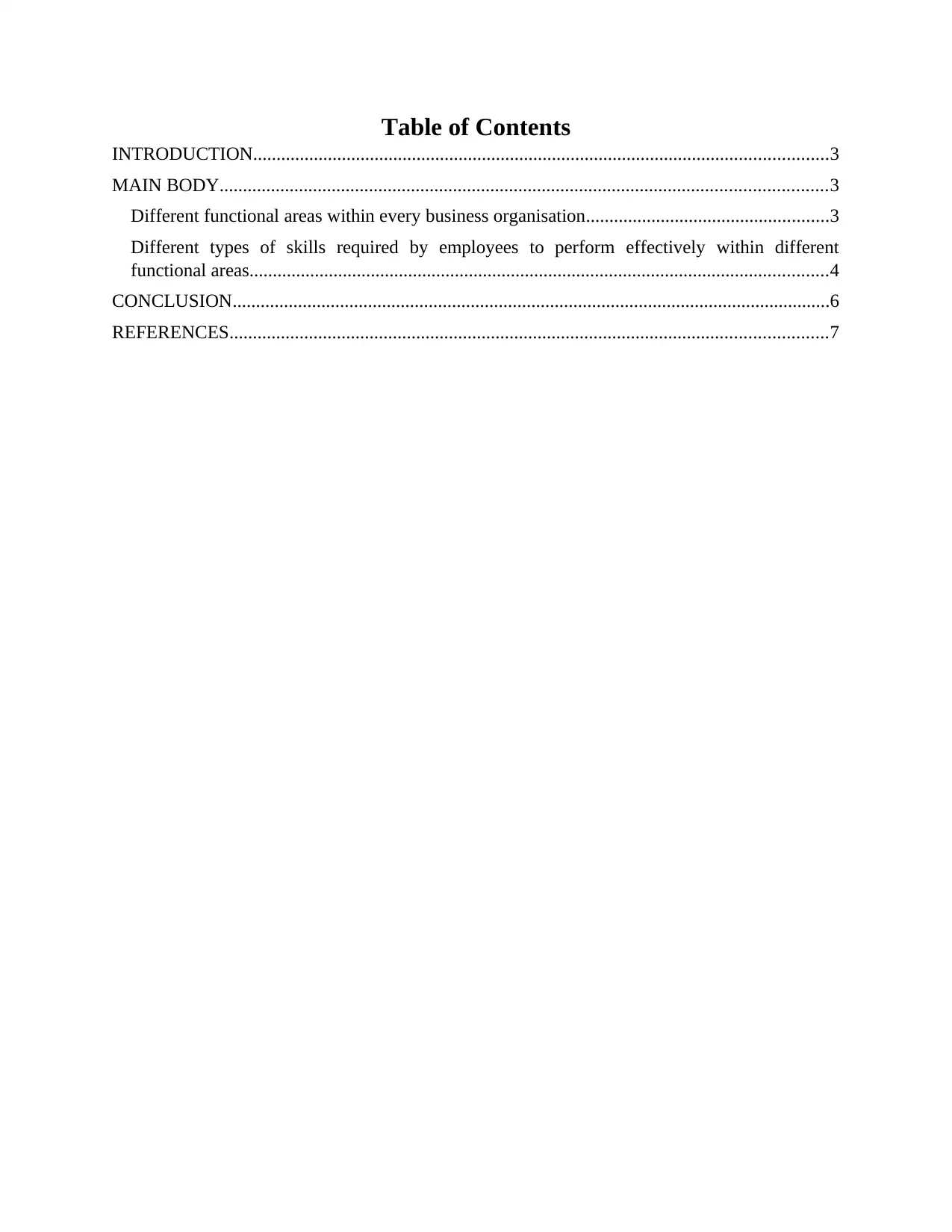
Table of Contents
INTRODUCTION...........................................................................................................................3
MAIN BODY..................................................................................................................................3
Different functional areas within every business organisation....................................................3
Different types of skills required by employees to perform effectively within different
functional areas............................................................................................................................4
CONCLUSION................................................................................................................................6
REFERENCES................................................................................................................................7
INTRODUCTION...........................................................................................................................3
MAIN BODY..................................................................................................................................3
Different functional areas within every business organisation....................................................3
Different types of skills required by employees to perform effectively within different
functional areas............................................................................................................................4
CONCLUSION................................................................................................................................6
REFERENCES................................................................................................................................7
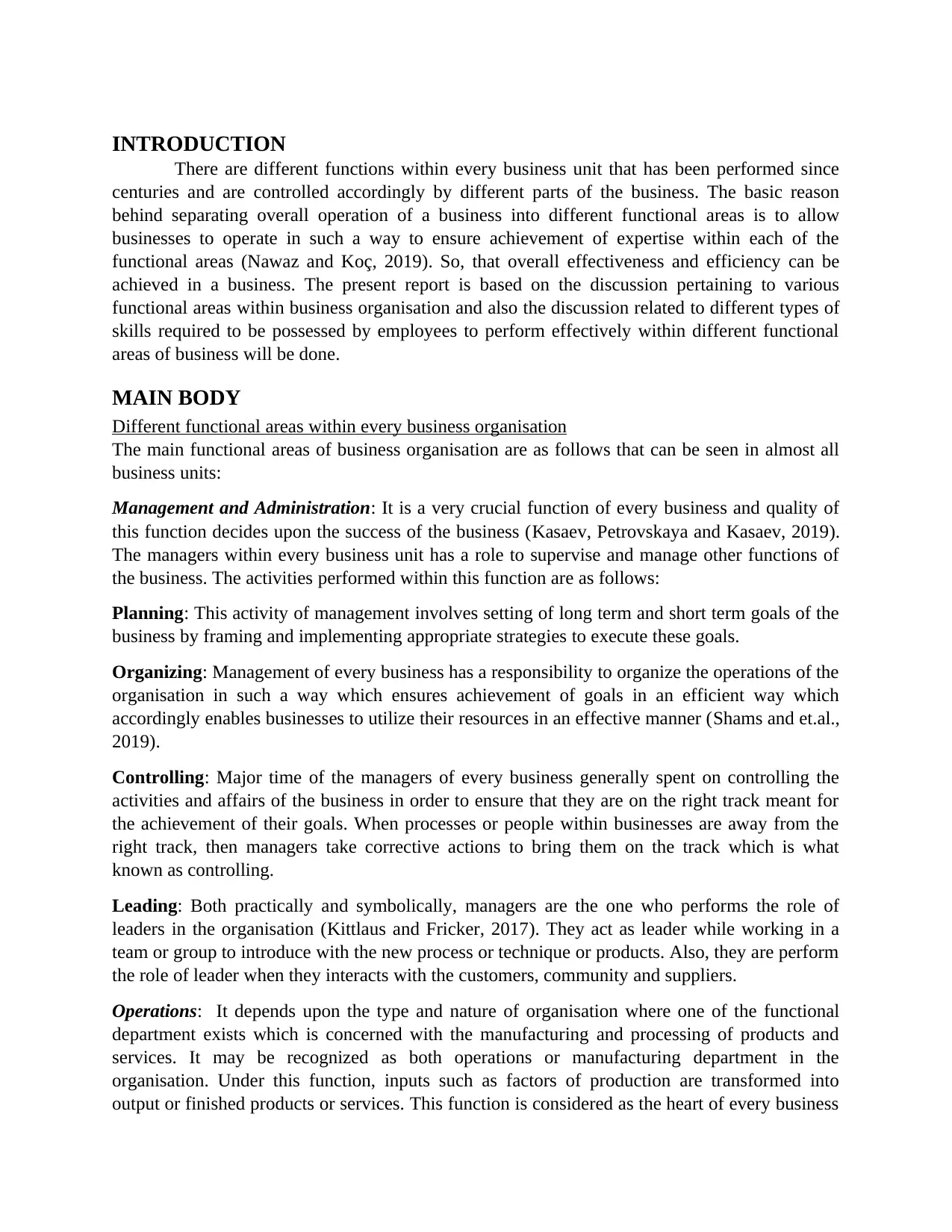
INTRODUCTION
There are different functions within every business unit that has been performed since
centuries and are controlled accordingly by different parts of the business. The basic reason
behind separating overall operation of a business into different functional areas is to allow
businesses to operate in such a way to ensure achievement of expertise within each of the
functional areas (Nawaz and Koç, 2019). So, that overall effectiveness and efficiency can be
achieved in a business. The present report is based on the discussion pertaining to various
functional areas within business organisation and also the discussion related to different types of
skills required to be possessed by employees to perform effectively within different functional
areas of business will be done.
MAIN BODY
Different functional areas within every business organisation
The main functional areas of business organisation are as follows that can be seen in almost all
business units:
Management and Administration: It is a very crucial function of every business and quality of
this function decides upon the success of the business (Kasaev, Petrovskaya and Kasaev, 2019).
The managers within every business unit has a role to supervise and manage other functions of
the business. The activities performed within this function are as follows:
Planning: This activity of management involves setting of long term and short term goals of the
business by framing and implementing appropriate strategies to execute these goals.
Organizing: Management of every business has a responsibility to organize the operations of the
organisation in such a way which ensures achievement of goals in an efficient way which
accordingly enables businesses to utilize their resources in an effective manner (Shams and et.al.,
2019).
Controlling: Major time of the managers of every business generally spent on controlling the
activities and affairs of the business in order to ensure that they are on the right track meant for
the achievement of their goals. When processes or people within businesses are away from the
right track, then managers take corrective actions to bring them on the track which is what
known as controlling.
Leading: Both practically and symbolically, managers are the one who performs the role of
leaders in the organisation (Kittlaus and Fricker, 2017). They act as leader while working in a
team or group to introduce with the new process or technique or products. Also, they are perform
the role of leader when they interacts with the customers, community and suppliers.
Operations: It depends upon the type and nature of organisation where one of the functional
department exists which is concerned with the manufacturing and processing of products and
services. It may be recognized as both operations or manufacturing department in the
organisation. Under this function, inputs such as factors of production are transformed into
output or finished products or services. This function is considered as the heart of every business
There are different functions within every business unit that has been performed since
centuries and are controlled accordingly by different parts of the business. The basic reason
behind separating overall operation of a business into different functional areas is to allow
businesses to operate in such a way to ensure achievement of expertise within each of the
functional areas (Nawaz and Koç, 2019). So, that overall effectiveness and efficiency can be
achieved in a business. The present report is based on the discussion pertaining to various
functional areas within business organisation and also the discussion related to different types of
skills required to be possessed by employees to perform effectively within different functional
areas of business will be done.
MAIN BODY
Different functional areas within every business organisation
The main functional areas of business organisation are as follows that can be seen in almost all
business units:
Management and Administration: It is a very crucial function of every business and quality of
this function decides upon the success of the business (Kasaev, Petrovskaya and Kasaev, 2019).
The managers within every business unit has a role to supervise and manage other functions of
the business. The activities performed within this function are as follows:
Planning: This activity of management involves setting of long term and short term goals of the
business by framing and implementing appropriate strategies to execute these goals.
Organizing: Management of every business has a responsibility to organize the operations of the
organisation in such a way which ensures achievement of goals in an efficient way which
accordingly enables businesses to utilize their resources in an effective manner (Shams and et.al.,
2019).
Controlling: Major time of the managers of every business generally spent on controlling the
activities and affairs of the business in order to ensure that they are on the right track meant for
the achievement of their goals. When processes or people within businesses are away from the
right track, then managers take corrective actions to bring them on the track which is what
known as controlling.
Leading: Both practically and symbolically, managers are the one who performs the role of
leaders in the organisation (Kittlaus and Fricker, 2017). They act as leader while working in a
team or group to introduce with the new process or technique or products. Also, they are perform
the role of leader when they interacts with the customers, community and suppliers.
Operations: It depends upon the type and nature of organisation where one of the functional
department exists which is concerned with the manufacturing and processing of products and
services. It may be recognized as both operations or manufacturing department in the
organisation. Under this function, inputs such as factors of production are transformed into
output or finished products or services. This function is considered as the heart of every business
⊘ This is a preview!⊘
Do you want full access?
Subscribe today to unlock all pages.

Trusted by 1+ million students worldwide
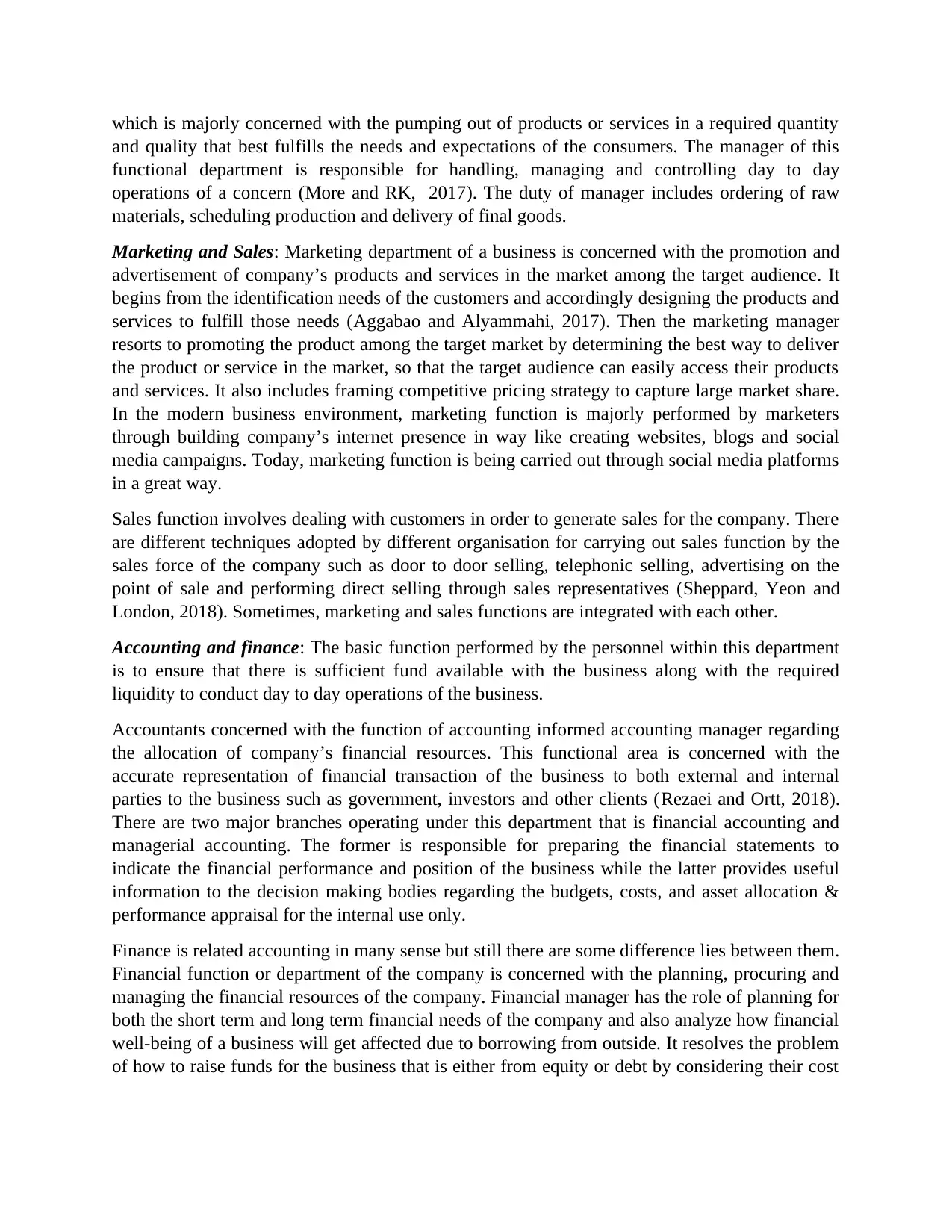
which is majorly concerned with the pumping out of products or services in a required quantity
and quality that best fulfills the needs and expectations of the consumers. The manager of this
functional department is responsible for handling, managing and controlling day to day
operations of a concern (More and RK, 2017). The duty of manager includes ordering of raw
materials, scheduling production and delivery of final goods.
Marketing and Sales: Marketing department of a business is concerned with the promotion and
advertisement of company’s products and services in the market among the target audience. It
begins from the identification needs of the customers and accordingly designing the products and
services to fulfill those needs (Aggabao and Alyammahi, 2017). Then the marketing manager
resorts to promoting the product among the target market by determining the best way to deliver
the product or service in the market, so that the target audience can easily access their products
and services. It also includes framing competitive pricing strategy to capture large market share.
In the modern business environment, marketing function is majorly performed by marketers
through building company’s internet presence in way like creating websites, blogs and social
media campaigns. Today, marketing function is being carried out through social media platforms
in a great way.
Sales function involves dealing with customers in order to generate sales for the company. There
are different techniques adopted by different organisation for carrying out sales function by the
sales force of the company such as door to door selling, telephonic selling, advertising on the
point of sale and performing direct selling through sales representatives (Sheppard, Yeon and
London, 2018). Sometimes, marketing and sales functions are integrated with each other.
Accounting and finance: The basic function performed by the personnel within this department
is to ensure that there is sufficient fund available with the business along with the required
liquidity to conduct day to day operations of the business.
Accountants concerned with the function of accounting informed accounting manager regarding
the allocation of company’s financial resources. This functional area is concerned with the
accurate representation of financial transaction of the business to both external and internal
parties to the business such as government, investors and other clients (Rezaei and Ortt, 2018).
There are two major branches operating under this department that is financial accounting and
managerial accounting. The former is responsible for preparing the financial statements to
indicate the financial performance and position of the business while the latter provides useful
information to the decision making bodies regarding the budgets, costs, and asset allocation &
performance appraisal for the internal use only.
Finance is related accounting in many sense but still there are some difference lies between them.
Financial function or department of the company is concerned with the planning, procuring and
managing the financial resources of the company. Financial manager has the role of planning for
both the short term and long term financial needs of the company and also analyze how financial
well-being of a business will get affected due to borrowing from outside. It resolves the problem
of how to raise funds for the business that is either from equity or debt by considering their cost
and quality that best fulfills the needs and expectations of the consumers. The manager of this
functional department is responsible for handling, managing and controlling day to day
operations of a concern (More and RK, 2017). The duty of manager includes ordering of raw
materials, scheduling production and delivery of final goods.
Marketing and Sales: Marketing department of a business is concerned with the promotion and
advertisement of company’s products and services in the market among the target audience. It
begins from the identification needs of the customers and accordingly designing the products and
services to fulfill those needs (Aggabao and Alyammahi, 2017). Then the marketing manager
resorts to promoting the product among the target market by determining the best way to deliver
the product or service in the market, so that the target audience can easily access their products
and services. It also includes framing competitive pricing strategy to capture large market share.
In the modern business environment, marketing function is majorly performed by marketers
through building company’s internet presence in way like creating websites, blogs and social
media campaigns. Today, marketing function is being carried out through social media platforms
in a great way.
Sales function involves dealing with customers in order to generate sales for the company. There
are different techniques adopted by different organisation for carrying out sales function by the
sales force of the company such as door to door selling, telephonic selling, advertising on the
point of sale and performing direct selling through sales representatives (Sheppard, Yeon and
London, 2018). Sometimes, marketing and sales functions are integrated with each other.
Accounting and finance: The basic function performed by the personnel within this department
is to ensure that there is sufficient fund available with the business along with the required
liquidity to conduct day to day operations of the business.
Accountants concerned with the function of accounting informed accounting manager regarding
the allocation of company’s financial resources. This functional area is concerned with the
accurate representation of financial transaction of the business to both external and internal
parties to the business such as government, investors and other clients (Rezaei and Ortt, 2018).
There are two major branches operating under this department that is financial accounting and
managerial accounting. The former is responsible for preparing the financial statements to
indicate the financial performance and position of the business while the latter provides useful
information to the decision making bodies regarding the budgets, costs, and asset allocation &
performance appraisal for the internal use only.
Finance is related accounting in many sense but still there are some difference lies between them.
Financial function or department of the company is concerned with the planning, procuring and
managing the financial resources of the company. Financial manager has the role of planning for
both the short term and long term financial needs of the company and also analyze how financial
well-being of a business will get affected due to borrowing from outside. It resolves the problem
of how to raise funds for the business that is either from equity or debt by considering their cost
Paraphrase This Document
Need a fresh take? Get an instant paraphrase of this document with our AI Paraphraser
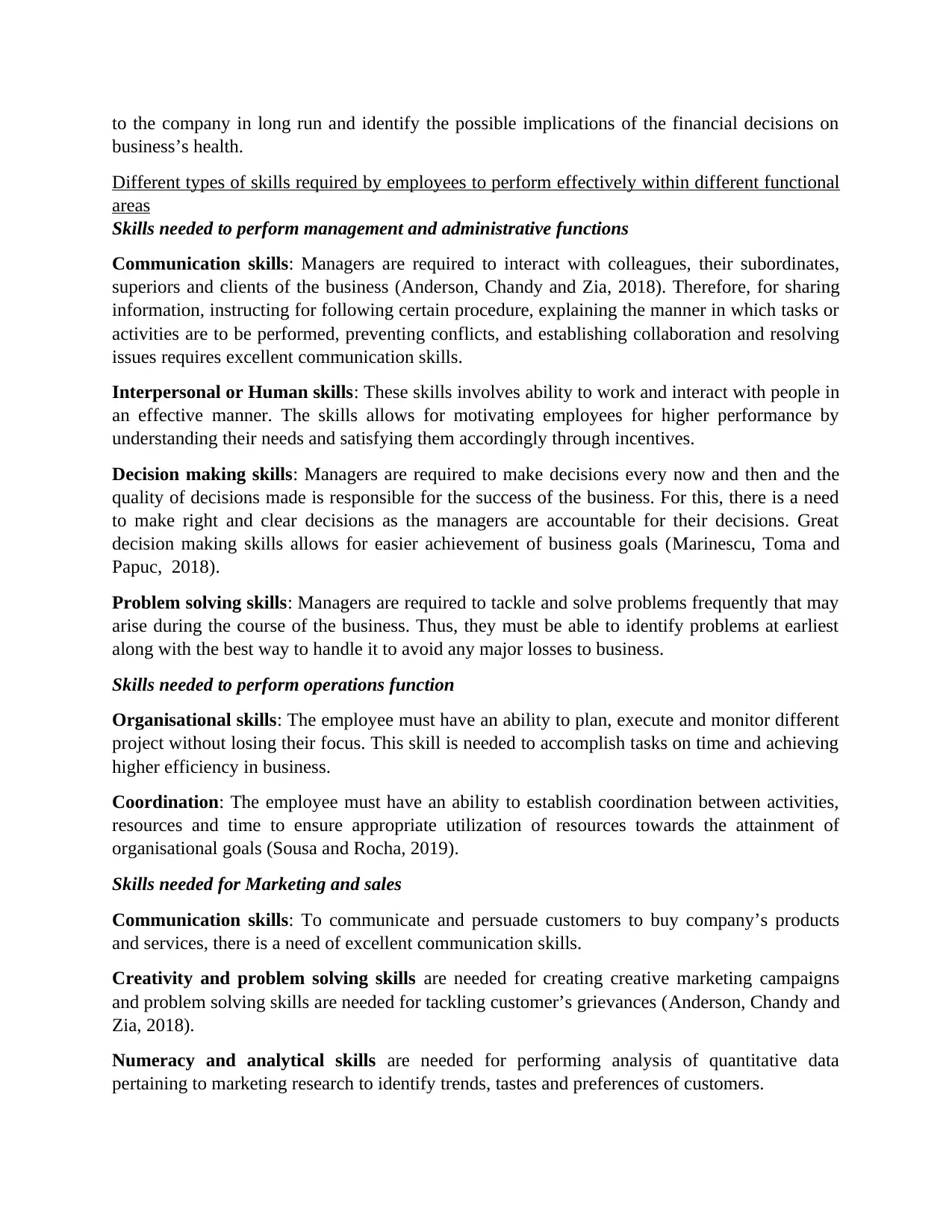
to the company in long run and identify the possible implications of the financial decisions on
business’s health.
Different types of skills required by employees to perform effectively within different functional
areas
Skills needed to perform management and administrative functions
Communication skills: Managers are required to interact with colleagues, their subordinates,
superiors and clients of the business (Anderson, Chandy and Zia, 2018). Therefore, for sharing
information, instructing for following certain procedure, explaining the manner in which tasks or
activities are to be performed, preventing conflicts, and establishing collaboration and resolving
issues requires excellent communication skills.
Interpersonal or Human skills: These skills involves ability to work and interact with people in
an effective manner. The skills allows for motivating employees for higher performance by
understanding their needs and satisfying them accordingly through incentives.
Decision making skills: Managers are required to make decisions every now and then and the
quality of decisions made is responsible for the success of the business. For this, there is a need
to make right and clear decisions as the managers are accountable for their decisions. Great
decision making skills allows for easier achievement of business goals (Marinescu, Toma and
Papuc, 2018).
Problem solving skills: Managers are required to tackle and solve problems frequently that may
arise during the course of the business. Thus, they must be able to identify problems at earliest
along with the best way to handle it to avoid any major losses to business.
Skills needed to perform operations function
Organisational skills: The employee must have an ability to plan, execute and monitor different
project without losing their focus. This skill is needed to accomplish tasks on time and achieving
higher efficiency in business.
Coordination: The employee must have an ability to establish coordination between activities,
resources and time to ensure appropriate utilization of resources towards the attainment of
organisational goals (Sousa and Rocha, 2019).
Skills needed for Marketing and sales
Communication skills: To communicate and persuade customers to buy company’s products
and services, there is a need of excellent communication skills.
Creativity and problem solving skills are needed for creating creative marketing campaigns
and problem solving skills are needed for tackling customer’s grievances (Anderson, Chandy and
Zia, 2018).
Numeracy and analytical skills are needed for performing analysis of quantitative data
pertaining to marketing research to identify trends, tastes and preferences of customers.
business’s health.
Different types of skills required by employees to perform effectively within different functional
areas
Skills needed to perform management and administrative functions
Communication skills: Managers are required to interact with colleagues, their subordinates,
superiors and clients of the business (Anderson, Chandy and Zia, 2018). Therefore, for sharing
information, instructing for following certain procedure, explaining the manner in which tasks or
activities are to be performed, preventing conflicts, and establishing collaboration and resolving
issues requires excellent communication skills.
Interpersonal or Human skills: These skills involves ability to work and interact with people in
an effective manner. The skills allows for motivating employees for higher performance by
understanding their needs and satisfying them accordingly through incentives.
Decision making skills: Managers are required to make decisions every now and then and the
quality of decisions made is responsible for the success of the business. For this, there is a need
to make right and clear decisions as the managers are accountable for their decisions. Great
decision making skills allows for easier achievement of business goals (Marinescu, Toma and
Papuc, 2018).
Problem solving skills: Managers are required to tackle and solve problems frequently that may
arise during the course of the business. Thus, they must be able to identify problems at earliest
along with the best way to handle it to avoid any major losses to business.
Skills needed to perform operations function
Organisational skills: The employee must have an ability to plan, execute and monitor different
project without losing their focus. This skill is needed to accomplish tasks on time and achieving
higher efficiency in business.
Coordination: The employee must have an ability to establish coordination between activities,
resources and time to ensure appropriate utilization of resources towards the attainment of
organisational goals (Sousa and Rocha, 2019).
Skills needed for Marketing and sales
Communication skills: To communicate and persuade customers to buy company’s products
and services, there is a need of excellent communication skills.
Creativity and problem solving skills are needed for creating creative marketing campaigns
and problem solving skills are needed for tackling customer’s grievances (Anderson, Chandy and
Zia, 2018).
Numeracy and analytical skills are needed for performing analysis of quantitative data
pertaining to marketing research to identify trends, tastes and preferences of customers.
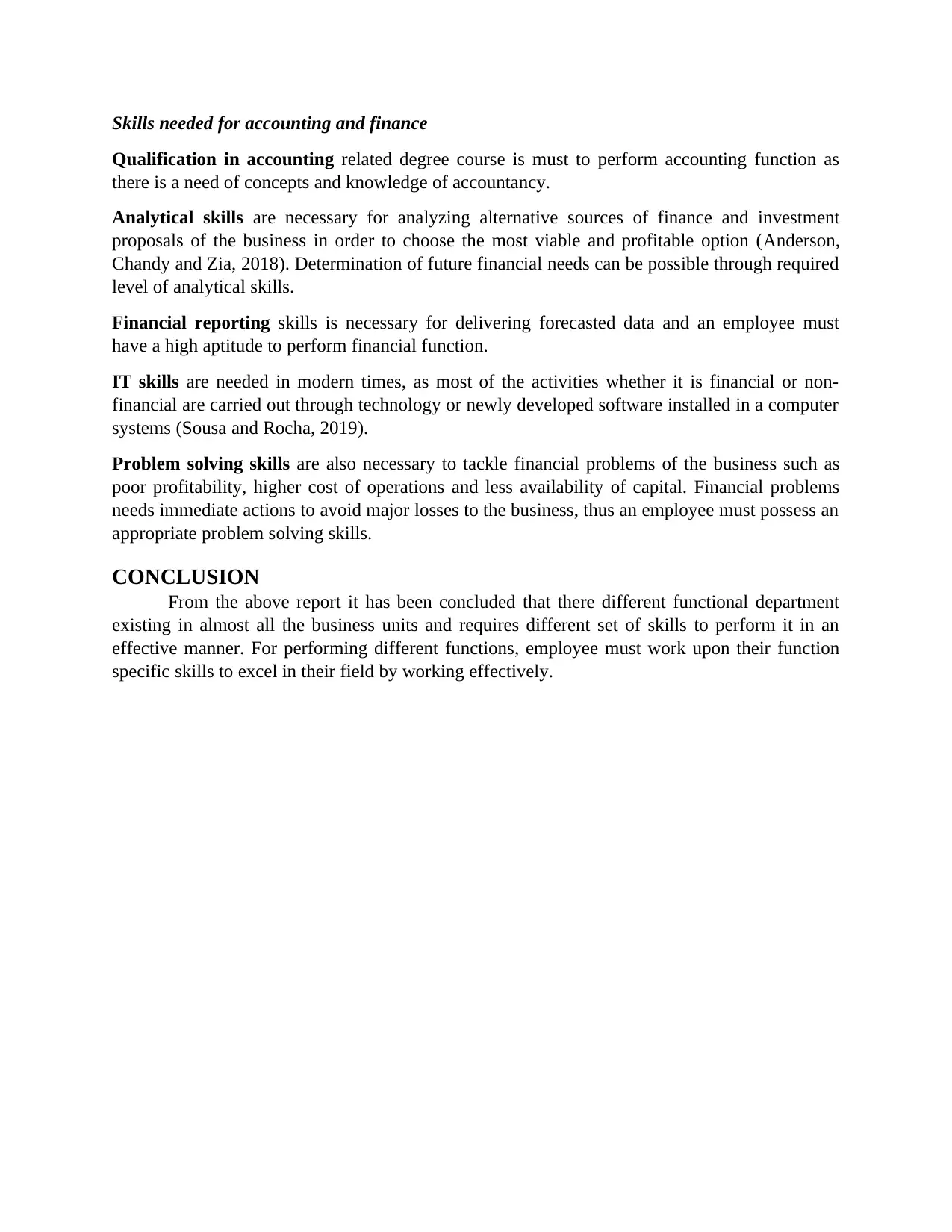
Skills needed for accounting and finance
Qualification in accounting related degree course is must to perform accounting function as
there is a need of concepts and knowledge of accountancy.
Analytical skills are necessary for analyzing alternative sources of finance and investment
proposals of the business in order to choose the most viable and profitable option (Anderson,
Chandy and Zia, 2018). Determination of future financial needs can be possible through required
level of analytical skills.
Financial reporting skills is necessary for delivering forecasted data and an employee must
have a high aptitude to perform financial function.
IT skills are needed in modern times, as most of the activities whether it is financial or non-
financial are carried out through technology or newly developed software installed in a computer
systems (Sousa and Rocha, 2019).
Problem solving skills are also necessary to tackle financial problems of the business such as
poor profitability, higher cost of operations and less availability of capital. Financial problems
needs immediate actions to avoid major losses to the business, thus an employee must possess an
appropriate problem solving skills.
CONCLUSION
From the above report it has been concluded that there different functional department
existing in almost all the business units and requires different set of skills to perform it in an
effective manner. For performing different functions, employee must work upon their function
specific skills to excel in their field by working effectively.
Qualification in accounting related degree course is must to perform accounting function as
there is a need of concepts and knowledge of accountancy.
Analytical skills are necessary for analyzing alternative sources of finance and investment
proposals of the business in order to choose the most viable and profitable option (Anderson,
Chandy and Zia, 2018). Determination of future financial needs can be possible through required
level of analytical skills.
Financial reporting skills is necessary for delivering forecasted data and an employee must
have a high aptitude to perform financial function.
IT skills are needed in modern times, as most of the activities whether it is financial or non-
financial are carried out through technology or newly developed software installed in a computer
systems (Sousa and Rocha, 2019).
Problem solving skills are also necessary to tackle financial problems of the business such as
poor profitability, higher cost of operations and less availability of capital. Financial problems
needs immediate actions to avoid major losses to the business, thus an employee must possess an
appropriate problem solving skills.
CONCLUSION
From the above report it has been concluded that there different functional department
existing in almost all the business units and requires different set of skills to perform it in an
effective manner. For performing different functions, employee must work upon their function
specific skills to excel in their field by working effectively.
⊘ This is a preview!⊘
Do you want full access?
Subscribe today to unlock all pages.

Trusted by 1+ million students worldwide
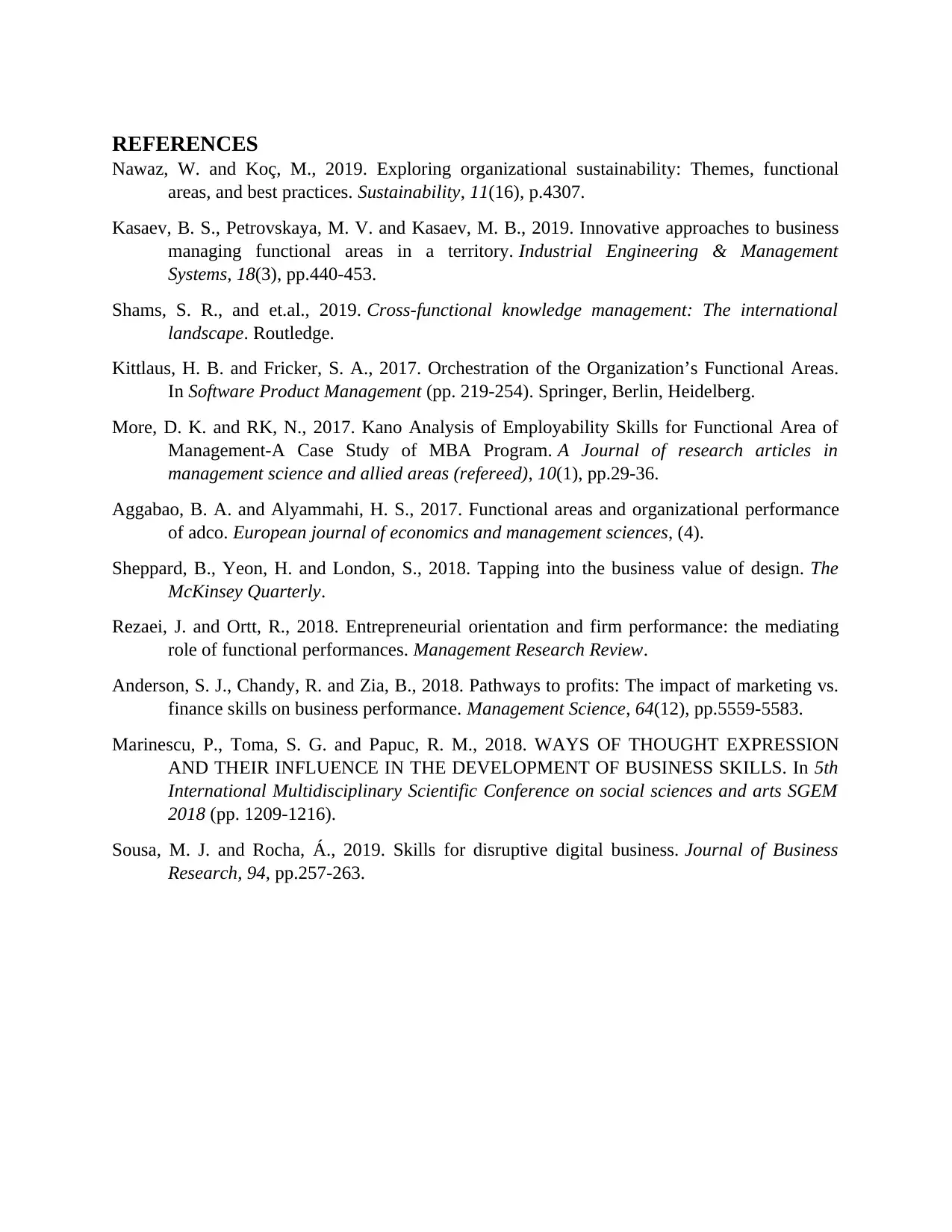
REFERENCES
Nawaz, W. and Koç, M., 2019. Exploring organizational sustainability: Themes, functional
areas, and best practices. Sustainability, 11(16), p.4307.
Kasaev, B. S., Petrovskaya, M. V. and Kasaev, M. B., 2019. Innovative approaches to business
managing functional areas in a territory. Industrial Engineering & Management
Systems, 18(3), pp.440-453.
Shams, S. R., and et.al., 2019. Cross-functional knowledge management: The international
landscape. Routledge.
Kittlaus, H. B. and Fricker, S. A., 2017. Orchestration of the Organization’s Functional Areas.
In Software Product Management (pp. 219-254). Springer, Berlin, Heidelberg.
More, D. K. and RK, N., 2017. Kano Analysis of Employability Skills for Functional Area of
Management-A Case Study of MBA Program. A Journal of research articles in
management science and allied areas (refereed), 10(1), pp.29-36.
Aggabao, B. A. and Alyammahi, H. S., 2017. Functional areas and organizational performance
of adco. European journal of economics and management sciences, (4).
Sheppard, B., Yeon, H. and London, S., 2018. Tapping into the business value of design. The
McKinsey Quarterly.
Rezaei, J. and Ortt, R., 2018. Entrepreneurial orientation and firm performance: the mediating
role of functional performances. Management Research Review.
Anderson, S. J., Chandy, R. and Zia, B., 2018. Pathways to profits: The impact of marketing vs.
finance skills on business performance. Management Science, 64(12), pp.5559-5583.
Marinescu, P., Toma, S. G. and Papuc, R. M., 2018. WAYS OF THOUGHT EXPRESSION
AND THEIR INFLUENCE IN THE DEVELOPMENT OF BUSINESS SKILLS. In 5th
International Multidisciplinary Scientific Conference on social sciences and arts SGEM
2018 (pp. 1209-1216).
Sousa, M. J. and Rocha, Á., 2019. Skills for disruptive digital business. Journal of Business
Research, 94, pp.257-263.
Nawaz, W. and Koç, M., 2019. Exploring organizational sustainability: Themes, functional
areas, and best practices. Sustainability, 11(16), p.4307.
Kasaev, B. S., Petrovskaya, M. V. and Kasaev, M. B., 2019. Innovative approaches to business
managing functional areas in a territory. Industrial Engineering & Management
Systems, 18(3), pp.440-453.
Shams, S. R., and et.al., 2019. Cross-functional knowledge management: The international
landscape. Routledge.
Kittlaus, H. B. and Fricker, S. A., 2017. Orchestration of the Organization’s Functional Areas.
In Software Product Management (pp. 219-254). Springer, Berlin, Heidelberg.
More, D. K. and RK, N., 2017. Kano Analysis of Employability Skills for Functional Area of
Management-A Case Study of MBA Program. A Journal of research articles in
management science and allied areas (refereed), 10(1), pp.29-36.
Aggabao, B. A. and Alyammahi, H. S., 2017. Functional areas and organizational performance
of adco. European journal of economics and management sciences, (4).
Sheppard, B., Yeon, H. and London, S., 2018. Tapping into the business value of design. The
McKinsey Quarterly.
Rezaei, J. and Ortt, R., 2018. Entrepreneurial orientation and firm performance: the mediating
role of functional performances. Management Research Review.
Anderson, S. J., Chandy, R. and Zia, B., 2018. Pathways to profits: The impact of marketing vs.
finance skills on business performance. Management Science, 64(12), pp.5559-5583.
Marinescu, P., Toma, S. G. and Papuc, R. M., 2018. WAYS OF THOUGHT EXPRESSION
AND THEIR INFLUENCE IN THE DEVELOPMENT OF BUSINESS SKILLS. In 5th
International Multidisciplinary Scientific Conference on social sciences and arts SGEM
2018 (pp. 1209-1216).
Sousa, M. J. and Rocha, Á., 2019. Skills for disruptive digital business. Journal of Business
Research, 94, pp.257-263.
1 out of 7
Related Documents
Your All-in-One AI-Powered Toolkit for Academic Success.
+13062052269
info@desklib.com
Available 24*7 on WhatsApp / Email
![[object Object]](/_next/static/media/star-bottom.7253800d.svg)
Unlock your academic potential
Copyright © 2020–2026 A2Z Services. All Rights Reserved. Developed and managed by ZUCOL.



